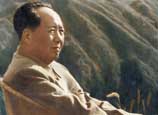
LAST week, a microblogger in Beijing logged into Sina Weibo, China's leading social media platform, to gossip about the "auntie" next door. It's a broad term of respect for an older woman, and his followers understood precisely what he meant when he tweeted, "The auntie next door used all of her retirement savings to buy gold. When asked what she'd do if prices keep dropping, she replied that if everyone kept buying gold, the price wouldn't drop..."
This might strike a conservative investor as reckless. But in China, where gold has long been a national obsession, a mid-April record crash in global gold prices has been seen as an unprecedented buying opportunity. According to reports in China, Chinese have purchased 300 tons of gold worth more than US$16 billion since the crash.
Photos of crowds packing jewelry shops and emptying their shelves are now regular features in the news media. A police officer in Shanxi province tweeted, in regard to his actual aunt: "My aunt's family has a gold store, and my colleague who's in the market for some gold for his mother asked if I could get him a cheap price. I asked, and my aunt said first come and take a look to see if anything catches your eye. But at the moment the display cases are empty, and they are unable to get new inventory. All I can say is that the power of the Chinese is frightening."
China's voracious appetite for gold is long-standing. At Chinese jewelry stores, the spot price for gold is always prominently displayed. Calculators and scales are never out of a customer's reach. Gold jewelry is desirable, but so are gold bars, and any jewelry store that considers itself full-service will stock ingots of various weights. (In April, an investor in Guangzhou bought 44 pounds of the bars, according to a local newspaper.) Special commemorative bars in various weights and designs were issued for the 2008 Beijing Olympics and the 2010 World Expo in Shanghai.
The current rush is unusual in two ways. The first is its epic scale. The second is that, according to both traditional and social media, aunties are doing most of the buying.
Who are these aunties? In the imaginations of many, they are the fierce, middle-aged housewives who walk through wet markets and supermarkets confidently, and pragmatically, negotiating bargains. When it comes to gold, as China Economic Weekly noted wryly on Monday: "They buy it like cabbage."
Middle-aged women
There's more than a hint of sexism in such characterizations and little actual data - beyond photos of middle-aged women buying jewelry. Nonetheless, news media sources - especially state-owned ones - are willing to repeat unflattering stereotypes explaining why these Chinese women are so interested in gold. (The US-based news media also can't seem to help themselves.)
Shanghai-based Liberation Daily not only joined other news outlets in comparing the gold-shopping habits of aunties to grocery shopping but also suggested: "Their knowledge of banking and finance is close to zero, so their investments change with the winds. They're also based on feelings, as well as the advice of close friends."
Social media tends to take a less critical, and more personal, view of the aunties. Depictions involving mother-daughter interactions, in particular, are very common. Zhongxiao Fang Fang Fang, the handle for a microblogger in Shenzhen, tweeted: "Yesterday my mother called me to say the price of gold has fallen, and to ask me to go to Hong Kong to buy gold. I said I didn't want any. She very calmly said it would be good to prepare a dowry so I can get married!"

















 New lease on life
New lease on life
Pay tribute to mothers who have been through Wenchuan earthquake


![]()
